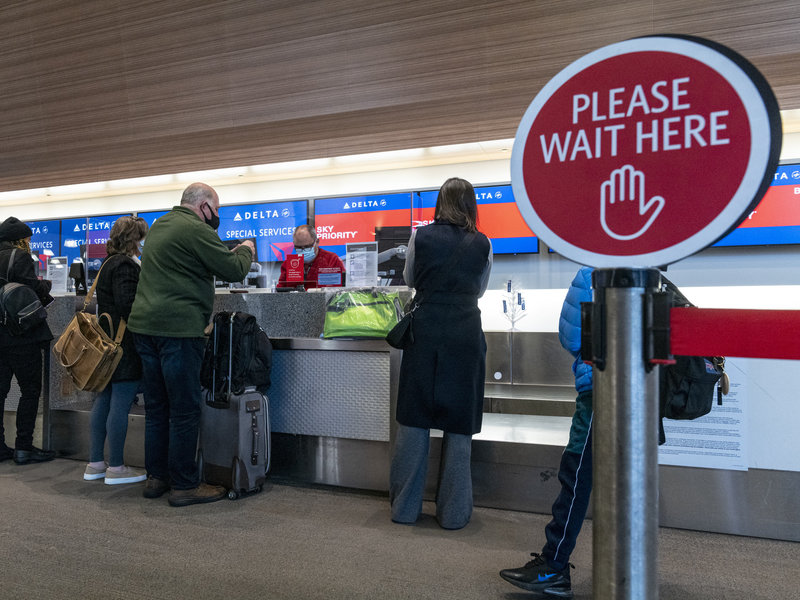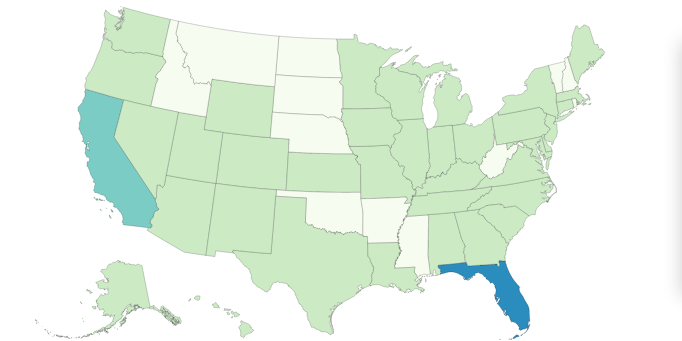Increased Travel Restrictions Signal More Economic Pain to Come
Disclosure: We are reader-supported. If you purchase from a link on our site, we may earn a commission. Learn more

This past week saw an increase in domestic and international travel restrictions in response to the increased varieties of coronavirus making the rounds around the U.S. and especially Florida and the South. Renewed calls for almost unprecedented travel restrictions between states increased across the board. The setback to travel in the U.S. and abroad threatens to cause more economic pain around the country and world. With coronavirus raging on, JP Morgan has projected a drop in Q1 2021 GDP.
Setbacks In Florida Increasing Calls for More Domestic Travel Restrictions
The new President Biden administration has been debating mandating travel restrictions domestically especially in Florida. It stems from fears that mutations in the coronavirus are potentially setting back the pandemic progress that has been painstakingly gained over the months. New variations on the virus, in particular more contagious ones coming from Great Britain, Brazil, and South Africa, have raised concerns that the mutations may be immune to the present vaccines.
A White House Official warned that this is adding impetus to possible travel restrictions across the U.S., with:
“There are active conversations about what could help mitigate spread here, but we have to follow the data and what's going to work. We did this with South Africa, we did this with Brazil, because we got clear guidance. But we're having conversations about anything that would help mitigate spread.”
The official was alluding to possible new restrictions on travel that might help to alleviate the increase of the British mutation within the state of Florida. Previous Covid taskforce recommendations have threatened to constrict U.S. Financial markets and economic output already.
British Covid Mutation Spurring Increased Travel Restrictions
The so-called United Kingdom variety has taken off wildly across Florida recently. Over one-third of all American cases of this B.1.1.7 have been found in the Sunshine state. Two federal officials cautioned that a decision was not imminent to be made. Such a restriction on travel or additional health measures would be taken in concert with local and state governments they pledged, with:
“This is a war and we're at battle with the virus. War is messy and unpredictable, and all options are on the table.”
Meanwhile travel industry executives continue discussing these potential additional actions with the CDC officials. Concern is rising that possible requirements for testing to board domestic flights may destroy what is left of the travel industry. Executive Vice President Tori Emerson Barnes of the U.S. Travel Association shared her thoughts after consulting with Biden administration officials:
“The variants are certainly of concern obviously to the CDC, and I think that the uncertainty around the variants has put other proposals on the table.”
New Administration Requirements May Include Domestic Airline Testing
It was on his first working day as President that Joe Biden mandated the Department of Transportation, the CDC, and the DHS to all expeditiously come up with a recommendations list for ways in which “their respective agencies may impose additional public health measures for domestic travel.”
Over the last week the CDC Director Rochelle Walensky and Transportation Secretary Pete Buttifieg have indicated that they are contemplating the possibility of mandating coronavirus testing for domestic flight passengers. Airline executives have been wildly opposed to this potential move. Barnes explained that:
“We had been pushing the use of a mask mandate, so we were very pleased to see the Biden administration put an executive order in place requiring masks in general spaces and in the airspace. That's absolutely critical. We have some concerns around the idea of a domestic testing requirement, because not only would it require a 42 percent increase in the testing capacity nationwide, but it's really not scalable, feasible, or effective.”
U.K. Covid Variant Spreading Wildly in Florida and the South
The hopeful news is that the total coronavirus cases throughout Florida have been on the decline over the last few weeks. Despite this silver lining, the British variety has been quickly spreading across the Sunshine state. As many as 15 percent of all newly discovered cases throughout the state are comprised of the U.K. variant now. This has rapidly grown from only one percent at the beginning of the year.
Even while the virus and varieties were spreading the Florida Governor Ron DeSantis has maintained an open state economy. In the early days of the pandemic, he signed an executive order that required visitors from New Jersey, New York, and Connecticut to enter 14 days of isolation upon arrival. This order was rescinded back in August.
Co-author William Lee of the B.1.1.7 U.S. modeling study warned that he anticipates the composition of the variant will double from every seven to 10 days in the state. The research team is carefully studying genetic information to see if the British variety outbreak spreads to other states from travelers who came back from vacationing in Florida. Last week Walensky warned that this variety makes up as much as from one to four percent of the national cases while its presence is heavier in some parts of the country. She explained that:
“We do not believe the variants are distributed equally across the country at this time.”
New Travel Restrictions Rapidly Increasing Domestically
Despite the threats of more travel restrictions, the big American airline carriers have boosted their numbers of flights into Florida over the last few weeks. Leisure travel appears to be bouncing back though business travel has not. Emory University public health expert Robert Bednarczyk warned that adding travel restrictions this late may be much like “closing the barn door once the horse is out.”
He warned that the B.1.1.7 variety has been spread around 34 different states even while it is more prevalent in California and Florida. This chart below shows the states where it has already spread:

Bednarczyk explained that:
“With only a small fraction of samples tested for specific mutations, this is likely underestimating the amount of spread. In addition to what we've been asking of the population — masks, distancing, avoiding large gatherings — I think people should consider avoiding travel, especially to tourist destinations where there's a greater chance of disease spread to individuals who can take it to more places.”
It may be after the fact now to try to stop the variant spread. Yet travel restrictions might slow down the speed of movement, according to Harvard School of Public Health Infectious Disease Expert Stephen Kissler. He added that the Coronavirus vaccines have only encouraged the public health officials to erect travel restrictions in an effort to slow down the variant spread. This provides them with more time to protect residents from the new virus. Kissler warned that:
“Right now we're in a race with the virus trying to get people vaccinated as quickly as possible, and B.1.1.7 is one of the most serious threats to that.”
In the past federal government officials have placed domestic travel restrictions on individuals carrying infectious diseases. The officials do have the power necessary to reduce and limit travel between various states thanks to the 1890-dated law the Public Health Service Act that permits the federal government to enforce regulations that will stop communicable disease from spreading “from one State or possession into any other State or possession.” Arguing the case for IRA-approved gold, broadly restricting the general population that has been exposed as a whole would amount to something new. Gold makes sense in an IRA because this is sure to significantly cut down on economic activity if enforced.



 Silver
Silver Gold
Gold Platinum
Platinum Palladium
Palladium Bitcoin
Bitcoin Ethereum
Ethereum

 Gold: $3,448.13
Gold: $3,448.13
 Silver: $39.73
Silver: $39.73
 Platinum: $1,370.20
Platinum: $1,370.20
 Palladium: $1,119.46
Palladium: $1,119.46
 Bitcoin: $108,459.67
Bitcoin: $108,459.67
 Ethereum: $4,480.21
Ethereum: $4,480.21